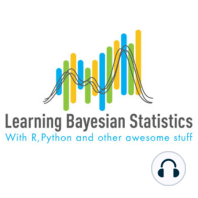44 min listen

#104 Automated Gaussian Processes & Sequential Monte Carlo, with Feras Saad
#104 Automated Gaussian Processes & Sequential Monte Carlo, with Feras Saad
ratings:
Length:
91 minutes
Released:
Apr 16, 2024
Format:
Podcast episode
Description
Proudly sponsored by PyMC Labs, the Bayesian Consultancy. Book a call, or get in touch!My Intuitive Bayes Online Courses1:1 Mentorship with meGPs are extremely powerful…. but hard to handle. One of the bottlenecks is learning the appropriate kernel. What if you could learn the structure of GP kernels automatically? Sounds really cool, but also a bit futuristic, doesn’t it?Well, think again, because in this episode, Feras Saad will teach us how to do just that! Feras is an Assistant Professor in the Computer Science Department at Carnegie Mellon University. He received his PhD in Computer Science from MIT, and, most importantly for our conversation, he’s the creator of AutoGP.jl, a Julia package for automatic Gaussian process modeling.Feras discusses the implementation of AutoGP, how it scales, what you can do with it, and how you can integrate its outputs in your models.Finally, Feras provides an overview of Sequential Monte Carlo and its usefulness in AutoGP, highlighting the ability of SMC to incorporate new data in a streaming fashion and explore multiple modes efficiently.Our theme music is « Good Bayesian », by Baba Brinkman (feat MC Lars and Mega Ran). Check out his awesome work at https://bababrinkman.com/ !Thank you to my Patrons for making this episode possible!Yusuke Saito, Avi Bryant, Ero Carrera, Giuliano Cruz, Tim Gasser, James Wade, Tradd Salvo, William Benton, James Ahloy, Robin Taylor,, Chad Scherrer, Zwelithini Tunyiswa, Bertrand Wilden, James Thompson, Stephen Oates, Gian Luca Di Tanna, Jack Wells, Matthew Maldonado, Ian Costley, Ally Salim, Larry Gill, Ian Moran, Paul Oreto, Colin Caprani, Colin Carroll, Nathaniel Burbank, Michael Osthege, Rémi Louf, Clive Edelsten, Henri Wallen, Hugo Botha, Vinh Nguyen, Marcin Elantkowski, Adam C. Smith, Will Kurt, Andrew Moskowitz, Hector Munoz, Marco Gorelli, Simon Kessell, Bradley Rode, Patrick Kelley, Rick Anderson, Casper de Bruin, Philippe Labonde, Michael Hankin, Cameron Smith, Tomáš Frýda, Ryan Wesslen, Andreas Netti, Riley King, Yoshiyuki Hamajima, Sven De Maeyer, Michael DeCrescenzo, Fergal M, Mason Yahr, Naoya Kanai, Steven Rowland, Aubrey Clayton, Jeannine Sue, Omri Har Shemesh, Scott Anthony Robson, Robert Yolken, Or Duek, Pavel Dusek, Paul Cox, Andreas Kröpelin, Raphaël R, Nicolas Rode, Gabriel Stechschulte, Arkady, Kurt TeKolste, Gergely Juhasz, Marcus Nölke, Maggi Mackintosh, Grant Pezzolesi, Avram Aelony, Joshua Meehl, Javier Sabio, Kristian Higgins, Alex Jones, Gregorio Aguilar, Matt Rosinski, Bart Trudeau, Luis Fonseca, Dante Gates, Matt Niccolls, Maksim Kuznecov, Michael Thomas, Luke Gorrie, Cory Kiser, Julio, Edvin Saveljev, Frederick Ayala, Jeffrey Powell and Gal Kampel.Visit https://www.patreon.com/learnbayesstats to unlock exclusive Bayesian swag ;)Takeaways:- AutoGP is a Julia package for automatic Gaussian process modeling that learns the
Released:
Apr 16, 2024
Format:
Podcast episode
Titles in the series (100)
#2 When should you use Bayesian tools, and Bayes in sports analytics, with Chris Fonnesbeck by Learning Bayesian Statistics